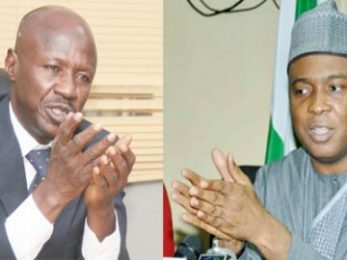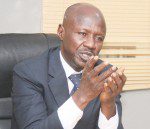Magu And Senate’s Rascality


THE Senate has ramped up its penchant for rascality and arrogance with two actions. In quick succession, it first passed a resolution asking the Acting President, Yemi Osinbajo, to sack Ibrahim Magu as acting chairman of the Economic and Financial Crimes Commission. It followed this up by announcing that it was suspending consideration and confirmation of appointments sent to it by the Presidency. For weeks senators have donned boxing gloves and come to the legislative chamber each morning ready to throw a punch at the executive. A few ignorant ones even muttered the idea of impeaching the Acting President. For how long must Nigerians put up with terribly poor service delivery by our lawmakers?
This legislature stands among the least productive since 1999. It’s a distressing result of the power intrigues that brought in the National Assembly’s leadership in 2015. But unchecked, impunity will always run riot and this is playing out in the Senate. The rascality was set in motion in December, when, citing a curious damaging memo from the State Security Service, the upper legislative chamber declined to confirm Magu in the post he had occupied several months in an acting capacity. In March this year, after his representation by President Muhammadu Buhari, and a hearing, the Senate declined once again to confirm him. Despite wide public disagreement with the reasons cited by the lawmakers for rejecting the crusading cop, no one disputed that Section 2 (3) of the EFCC Act conferred on the Senate the power to confirm an appointee as substantive chairman.
However, both Buhari and Osinbajo, who is filling in for the ailing President, have reiterated their full confidence in Magu continuing to act until a substantive chair is found. But the Senate is going beyond its brief, seeking, as alleged by Itse Sagay, a professor of law, to “be co-executive with the Presidency…” It has now backed its insolent demand that Magu be removed with an unenforceable resolution. To demonstrate how desperate they are to see Magu off, their refusal to undertake their statutory function of confirming some federal appointees is underscored by what some see as a veiled threat to impeach Osinbajo. The Presidency should strongly resist the blackmail.
Though falsely wrapped up as a campaign for separation of powers, what is playing out is a strong push-back against the anti-corruption war. For instance, the Federal Government has filed an appeal challenging the Senate President, Bukola Saraki’s acquittal at the Code of Conduct Tribunal. Magu, like Nuhu Ribadu, before him, is the nemesis of the rich and powerful accused of corruption. No fewer than 10 senators, Saraki inclusive, are under EFCC investigation and prosecution for alleged corrupt practices.
Many senior lawyers have argued that while the EFCC Act requires Senate confirmation for a substantive chair, the chamber has no say in who sits thereon in acting capacity. Those who say Magu should go, having been rejected by the Senate, have been met with further arguments that Section 171 (1) of the 1999 Constitution that states: “Power to appoint persons to hold or act in the offices to which this section applies and to remove persons so appointed from any such office shall vest in the President.” The Senate has a role in who is confirmed as the substantive chair; it has none in who acts in that capacity, until a court decides otherwise.
Nigerians who may be beguiled by the hypocrisy of the anti-Magu forces should remember that as substantive Director of Operations, he is the most senior EFCC operative and the standard practice in the public service is that when there is a vacuum at the top, the most senior official acts until he is either confirmed or a new head is appointed.
But for the desperation of the Senate and other entrenched interests out to kill the anti-corruption war, Magu’s should not have been different. The Senate’s decision to stop confirmation hearings beginning with the headship of the lottery commission, ostensibly in response to Osinbajo’s comment that certain appointments don’t need confirmation, is arrogant and disdainful of the electorate. They were not elected to fight ego battles at public expense. They can, if they wish, seek a judicial interpretation of the cited constitutional provision in Section 171 that Osinbajo, Sagay and other senior advocates say supersedes laws that compel Senate confirmation.
While the Senate indulges in egotistic battles and threatens to cripple governance, it is neglecting important state affairs. Nigeria is beset with political, economic and social problems. Insecurity is rampant. Some groups have threatened to disrupt elections in the South-East and South-South regions; police have become helpless in the face of kidnapping and cult violence across the country; the economy is limping along and the prediction that Nigeria will exit recession by the third quarter is threatened by renewed decline in oil prices; floods, accidents and communal clashes are ubiquitous, and unemployment at 14.2 per cent understates the youth jobless rate some estimate at 40 per cent.
There is a signal lack of concern and leadership from the National Assembly as separatist agitation and intemperate exchanges among ethnic militants raise tension in the country. Their preoccupation is with flushing out a diminutive detective whom the Presidency has said has its full confidence to prosecute its anti-graft agenda.
We should not continue to allow reactionary forces to derail the national quest for clean government. The coalition that forced out Ribadu, the pioneer chair of EFCC, and his successor, Farida Waziri, should be fiercely resisted. We are confronted with a failure of party cohesion and discipline since the majority of senators belong to the same ruling party. Where their personal interests are concerned, party differences become irrelevant to our unconscionable legislators. A report last week revealed how the parliament reportedly inserted 1,170 unplanned, self-serving projects into the 2017 budget under the Ministry of Power, Works and Housing alone, raising its total outlay by N22.4 billion and sabotaging several major infrastructure projects.
Rather than cave in to blackmail, Osinbajo should reinvigorate his full backing for the EFCC to crush corruption, no matter who the dragnet snags. He and Magu should not strike any deals that will weaken the anti-corruption crusade. In the face of judicial ambush, connivance by influential lawyers, a hostile and well-heeled political class and perceived mischief by a shadowy cabal within its ranks, the Presidency needs to fight the 1,000 elites that EFCC says are holding Nigeria to ransom. The leadership of the political parties should place national interest above all else and prevail on the power-drunk senators to put national service above ego, pursuit and protection of ill-gotten wealth and elite privilege. As the storms gather, the Senate must be ready to square up with the Nigerian people.
Source: Punch








